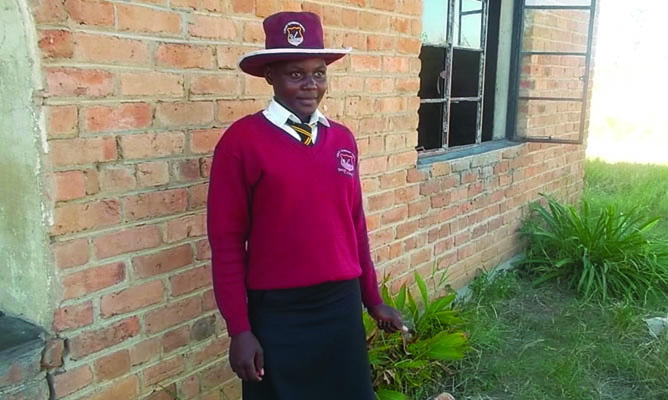
TWO years ago, Felicity Mukaikwa (16) was a dejected student just going through the motions of attending school though her heart was not into it.
BY FEATURES CORRESPONDENT
Neither was her mind. So de-motivated was she that learning was an unbearable chore “ruthlessly” foisted upon her by her parents and other family elders.
She remembers all too well how, for years, her classroom at Cowley School had a leaky roof and in the rainy season books would get soaked from the rain and pupils would huddle in the corners of the room which were less exposed to the elements.
With all the shuffling and the huddling around to keep from being drenched from pouring rains, lessons would repeatedly be disrupted and progress hampered. In drier, but windy times, dust would come into the classroom in whirlwinds and wreak its own havoc causing more disturbances.
“It was very difficult for us. If it wasn’t one thing it was another,” says Mukaikwa.
With such learning conditions, many pupils would be regularly absent from school and teachers did not want to be deployed to the school.
“We could not get teachers to come and teach at the school. With an enrolment of 120 pupils at the time, we only had two teachers,” says the headmaster, Israel Moyo.
- Chamisa under fire over US$120K donation
- Mavhunga puts DeMbare into Chibuku quarterfinals
- Pension funds bet on Cabora Bassa oilfields
- Councils defy govt fire tender directive
Keep Reading
Situated at a resettlement area in Ward Two in the rural yonder of Bindura, the struggling school, which was established in 2002, also suffered from low pass rates and could hardly serve its catchment area of nearly 5 000 households.
As a result, most of the pupils in the area would opt to walk to alternative schools 25 kilometres from the resettlement. Yet others would go and stay with relatives in Bindura town some 70km away.
But that was then
Today the school is no longer the dreary, measly and deficient structure it once was, but is now a flourishing institution boasting eight classrooms, each with its own office, white boards and ceilings to boot.
Manned by eight teachers and a headmaster, the school’s pass rate has risen placing it fourth out of 22 schools in the district last year, all of which are part of a feat which was made possible by funding from the Bindura Community Share Ownership Trust (BCSOT) under provisions of the Indigenisation Act which compels companies which exploit natural resources from the vicinity to give back to surrounding communities.
Under the share ownership scheme, BCSOT in 2013 provided funding which saw the completion of one block of classrooms and added three new blocks to the school — making a total of four blocks.
According to the BCSOT chairperson, Joel Nyarumwe, who is also Chief Musana, the funding was made possible by disbursements to BCSOT by Freda Rebecca, a gold mine in Bindura.
“They pledged to give us $1 million a year for 10 years from 2013. So far, in these past two years, they have given us $1 500 000 — which was full contribution in 2013, part payment in 2014 — and we are still waiting for the remainder for 2014 and also to be able to catch up for 2015,” Nyarumwe said.
The school which, according to Emmanuel Jaricha, BCSOT administrator, was developed at a cost of $193 047,00, has seen enrolment more than double to 256 from 120.
Morale at the school is at an all time high as proud students are eager to learn in their new environment.
“We are now very proud of our school,” says Mukaikwa, who is now in Form Four and preparing for her major public exams at the end of the year. “Gone are the days of leaky roofs.
No more wet books, no more disrupted classes. There are now more of us pupils here; no more absentee teachers and we like it that way:”
“This is greatly appreciated,” says headmaster Moyo. “Pupils are more motivated and so are we. Now teachers from elsewhere are scrambling to come and teach here.”
Ward Two councillor Ngonidzashe Zanamwe could not be happier.
“This is the only secondary school in Bindura North and we are very proud of it. The share ownership programmes were initiated by President Robert Mugabe and we are very pleased with such development.
“We also feel very indebted to BCSOT and Freda Rebecca who made this possible,” says Zanamwe.
A total of US$193, 047 was spent on Cowley Secondary School by BCSOT.
Today the school is no longer the dreary, measly and deficient structure it once was, but is now a flourishing institution boasting eight classrooms, each with its own office, white boards and ceilings to boot.











